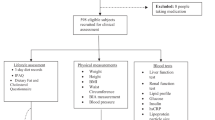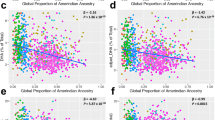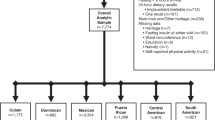Abstract
Background/Objectives:
Certain populations with a large proportion of indigenous American (IA) genetic ancestry may be evolutionarily adapted to traditional diets high in legumes and complex carbohydrates, and may have a detrimental metabolic response to US diets high in refined carbohydrates and added sugars. We tested whether IA ancestry modified the metabolic response to a US versus traditional Mexican diet in a controlled dietary intervention.
Subjects/Methods:
First and second generation Mexican immigrant women (n=53) completed a randomized crossover feeding trial testing the effects of a US versus traditional Mexican diet. The metabolic response to the diets was measured by fasting serum concentrations of glucose, insulin, insulin-like growth factor-1 (IGF-1), IGF-binding protein-3 (IGFBP-3), adiponectin, C-reactive protein, interleukin-6 and computed homeostasis model assessment for insulin resistance (HOMAIR). Blood collected at baseline was used for genotyping, and estimation of African, European and IA ancestries with the use of 214 ancestry informative markers.
Results:
The genetic ancestral background was 56% IA, 38% European and 6% African. Women in the highest IA ancestry tertile (>62%) were shorter in height, less educated and less acculturated to the US lifestyle, and tended to have higher waist-to-hip ratio compared with women in the middle and lowest IA ancestry tertiles, respectively. Compared with the US diet, the traditional Mexican diet tended to reduce glucose, insulin, IGF-1, IGFBP-3 and HOMAIR among women in the middle IA ancestry group (IA ancestry ⩽45–62%), whereas having no effect on biomarkers related to inflammation.
Conclusions:
We observed modest interactions between IA ancestry and the metabolic response to a US versus traditional Mexican diet among Mexican immigrant women.
This is a preview of subscription content, access via your institution
Access options
Subscribe to this journal
Receive 12 print issues and online access
$259.00 per year
only $21.58 per issue
Buy this article
- Purchase on Springer Link
- Instant access to full article PDF
Prices may be subject to local taxes which are calculated during checkout

Similar content being viewed by others
References
Batis C, Hernandez-Barrera L, Barquera S, Rivera JA, Popkin BM . Food acculturation drives dietary differences among Mexicans, Mexican Americans, and non-Hispanic Whites. J Nutr 2011; 141: 1898–1906.
Neuhouser ML, Thompson B, Solomon CC . Higher fat intake and lower fruit and vegetables intakes are associated with greater acculturation among Mexicans living in Washington state. J Am Diet Assoc 2004; 104: 51–57.
Santiago-Torres M, Tinker LF, Allison MA, Breymeyer KL, Garcia L, Kroenke CH et al. Development and use of a traditional Mexican diet score in relation to systemic inflammation and insulin resistance among women of Mexican descent. J Nutr 2015; 145: 2732–2740.
Murtaugh MA, Herrick JS, Sweeney C, Baumgartner KB, Guiliano AR, Byers T et al. Diet composition and risk of overweight and obesity in women living in the southwestern United States. J Am Diet Assoc 2007; 107: 1311–1321.
Murtaugh MA, Sweeney C, Giuliano AR, Herrick JS, Hines L, Byers T et al. Diet patterns and breast cancer risk in Hispanic and non-Hispanic white women: the Four-Corners Breast Cancer Study. Am J Clin Nutr 2008; 87: 978–984.
Neel JV . Diabetes mellitus: a ‘thrifty’ genotype rendered detrimental by ‘progress’? 1962. Bull World Health Organ 1999; 77: 694–703.
Gordon-Larsen P, Harris KM, Ward DS, Popkin BM, National Longitudinal Study of Adolescent Health. Acculturation and overweight-related behaviors among Hispanic immigrants to the US: the National Longitudinal Study of Adolescent Health. Soc Sci Med 2003; 57: 2023–2034.
van Rompay MI, McKeown NM, Castaneda-Sceppa C, Falcon LM, Ordovas JM, Tucker KL . Acculturation and sociocultural influences on dietary intake and health status among Puerto Rican adults in Massachusetts. J Acad Nutr Diet 2012; 112: 64–74.
Casazza K, Hanks LJ, Beasley TM, Fernandez JR . Beyond thriftiness: independent and interactive effects of genetic and dietary factors on variations in fat deposition and distribution across populations. Am J Phys Anthropol 2011; 145: 181–191.
Collins-Schramm HE, Chima B, Morii T, Wah K, Figueroa Y, Criswell LA et al. Mexican American ancestry-informative markers: examination of population structure and marker characteristics in European Americans, Mexican Americans, Amerindians and Asians. Hum Genet 2004; 114: 263–271.
Qu HQ, Li Q, Lu Y, Hanis CL, Fisher-Hoch SP, McCormick JB . Ancestral effect on HOMA-IR levels quantitated in an American population of Mexican origin. Diabetes Care 2012; 35: 2591–2593.
Nassir R, Qi L, Kosoy R, Garcia L, Allison M, Ochs-Balcom HM et al. Relationship between adiposity and admixture in African-American and Hispanic-American women. Int J Obes 2012; 36: 304–313.
Qi L, Nassir R, Kosoy R, Garcia L, Curb JD, Tinker L et al. Relationship between diabetes risk and admixture in postmenopausal African-American and Hispanic-American women. Diabetologia 2012; 55: 1329–1337.
Santiago-Torres M, Kratz M, Lampe JW, Tapsoba JD, Breymeyer K, Levy L et al. Metabolic responses to a traditional Mexican compared with a commonly consumed US diet in women of Mexican descent: a randomized crossover feeding trial. Am J Clin Nutr 2016; 103: 1–9.
Norgan NG . A review of ‘Anthropometric Standardization Reference Manual’. Edited by TG Lohman, AF Roche and R Martorell. (Champaign, IL.: Human Kinetics Books, 1988.). Ergonomics 1988; 31: 1493–1494.
Galanter JM, Fernandez-Lopez JC, Gignoux CR, Barnholtz-Sloan J, Fernandez-Rozadilla C, Via M et al. Development of a panel of genome-wide ancestry informative markers to study admixture throughout the Americas. PLoS Genet 2012; 8: e1002554.
Daya M, van der Merwe L, Galal U, Moller M, Salie M, Chimusa ER et al. A panel of ancestry informative markers for the complex five-way admixed South African coloured population. PLoS One 2013; 8: e82224.
Avena S, Via M, Ziv E, Perez-Stable EJ, Gignoux CR, Dejean C et al. Heterogeneity in genetic admixture across different regions of Argentina. PLoS One 2012; 7: e34695.
Alexander DH, Novembre J, Lange K . Fast model-based estimation of ancestry in unrelated individuals. Genome Res 2009; 19: 1655–1664.
Lins TC, Pires AS, Paula RS, Moraes CF, Vieira RG, Vianna LG et al. Association of serum lipid components and obesity with genetic ancestry in an admixed population of elderly women. Genet Mol Biol 2012; 35: 575.
Fejerman L, Stern MC, John EM, Torres-Mejia G, Hines LM, Wolff RK et al. Interaction between common breast cancer susceptibility variants, genetic ancestry, and nongenetic risk factors in Hispanic women. Cancer Epidemiol Biomarkers Prev 2015; 24: 1731–1738.
Hankinson SE, Willett WC, Colditz GA, Hunter DJ, Michaud DS, Deroo B et al. Circulating concentrations of insulin-like growth factor-I and risk of breast cancer. Lancet 1998; 351: 1393–1396.
Rinaldi S, Biessy C, Hernandez M, Lesueur F, dos-Santos-Silva I, Rice MS et al. Circulating concentrations of insulin-like growth factor-I, insulin-like growth factor-binding protein-3, genetic polymorphisms and mammographic density in premenopausal Mexican women: results from the ESMaestras cohort. Int J Cancer 2014; 134: 1436–1444.
Wood TL, Yee D . Introduction: IGFs and IGFBPs in the normal mammary gland and in breast cancer. J Mammary Gland Biol Neoplasia 2000; 5: 1–5.
Fejerman L, Romieu I, John EM, Lazcano-Ponce E, Huntsman S, Beckman KB et al. European ancestry is positively associated with breast cancer risk in Mexican women. Cancer Epidemiol Biomarkers Prev 2010; 19: 1074–1082.
Fejerman L, Hu DL, Huntsman S, John EM, Stern MC, Haiman CA et al. Genetic ancestry and risk of mortality among US Latinas with breast cancer. Cancer Res 2013; 73: 7243–7253.
Florez JC, Price AL, Campbell D, Riba L, Parra MV, Yu F et al. Strong association of socioeconomic status with genetic ancestry in Latinos: implications for admixture studies of type 2 diabetes. Diabetologia 2009; 52: 1528–1536.
Martinez-Marignac VL, Valladares A, Cameron E, Chan A, Perera A, Globus-Goldberg R et al. Admixture in Mexico city: implications for admixture mapping of type 2 diabetes genetic risk factors. Hum Genet 2007; 120: 807–819.
Piccolo RS, Pearce N, Araujo AB, McKinlay JB . The contribution of biogeographical ancestry and socioeconomic status to racial/ethnic disparities in type 2 diabetes mellitus: results from the Boston Area Community Health Survey. Ann Epidemiol 2014; 24: 648–654.
Neuhouser ML, Schwarz Y, Wang CC, Breymeyer K, Coronado G, Wang CY et al. A low-glycemic load diet reduces serum C-reactive protein and modestly increases adiponectin in overweight and obese adults. J Nutr 2012; 142: 369–374.
Kratz M, Swarbrick MM, Callahan HS, Matthys CC, Havel PJ, Weigle DS . Effect of dietary n-3 polyunsaturated fatty acids on plasma total and high-molecular-weight adiponectin concentrations in overweight to moderately obese men and women. Am J Clin Nutr 2008; 87: 347–353.
Gregor MF, Hotamisligil GS . Inflammatory mechanisms in obesity. Annu Rev Immunol 2011; 29: 415–445.
Festa A, D'Agostino R, Williams K, Karter AJ, Mayer-Davis EJ, Tracy RP et al. The relation of body fat mass and distribution to markers of chronic inflammation. Int J Obes 2001; 25: 1407–1415.
Acknowledgements
This work was supported by the National Cancer Institute (NCI) grant P50 CA148143 and the Cancer Center Support Grant P30CA 015704. MS-T is currently supported by grant R25 CA094880 from the NCI. The trial was registered at clinicaltrials.gov (identifier: NCT01369173).
Author contributions
CSC, MLN and JWL designed the research; KLB, LL and AV designed the experimental diets; KLB, LL and XS implemented the study protocol; CSC, MS-T, JDDT and C-YW analyzed the data; MS-T wrote the paper; MS-T, CSC and MLN had primary responsibility for the final content; and all co-authors critically reviewed and revised the manuscript.
Author information
Authors and Affiliations
Corresponding author
Ethics declarations
Competing interests
The authors declare no conflict of interest.
Additional information
Supplementary Information accompanies this paper on European Journal of Clinical Nutrition website
Supplementary information
Rights and permissions
About this article
Cite this article
Santiago-Torres, M., De Dieu Tapsoba, J., Kratz, M. et al. Genetic ancestry in relation to the metabolic response to a US versus traditional Mexican diet: a randomized crossover feeding trial among women of Mexican descent. Eur J Clin Nutr 71, 395–401 (2017). https://doi.org/10.1038/ejcn.2016.211
Received:
Revised:
Accepted:
Published:
Issue Date:
DOI: https://doi.org/10.1038/ejcn.2016.211



